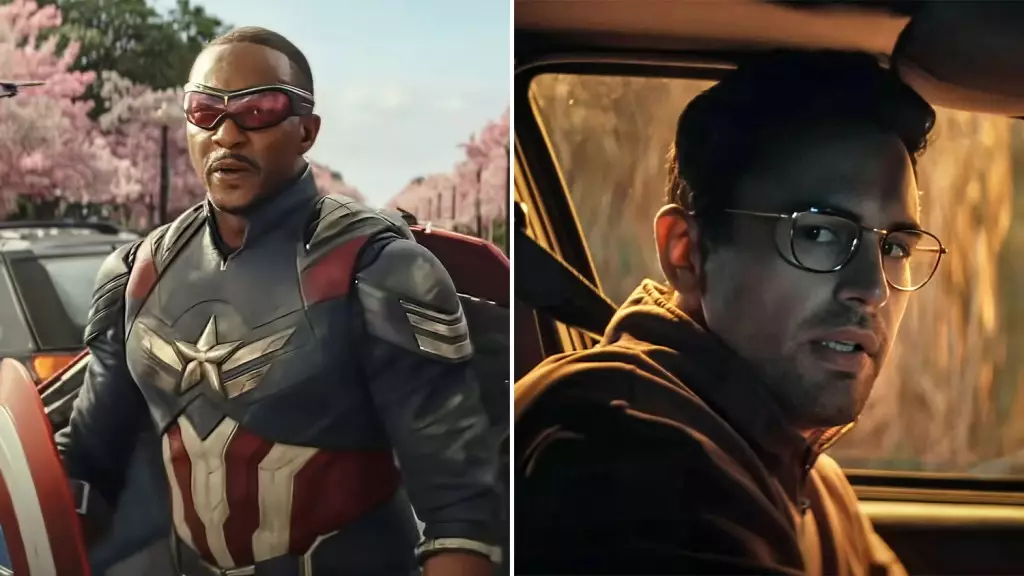As the cinematic landscape continually evolves, this coming weekend showcases two contrasting films vying for the audience’s attention. Marvel Studios’ latest offering, *Captain America: Brave New World*, is projected to hold a commanding position at the box office during its second weekend, raking in over $30 million. In stark contrast, Neon’s new horror film, *The Monkey*, is also primed to make a significant impact, potentially grossing around $17 million despite its indie roots. This juxtaposition highlights the ongoing battle between established franchises and emerging voices in cinema, providing insight into audience preferences and marketing strategies.
*Captain America: Brave New World* made a substantial entrance with a $100 million opening over the four-day holiday, a feat that marks a strong performance by the Marvel Cinematic Universe (MCU) amidst mixed reviews. Its CinemaScore of B- adds an interesting layer, signaling a potential decline similar to other MCU projects like *Eternals* and *The Marvels*, which saw their box office clout diminish rapidly in subsequent weeks. Analysts are closely monitoring whether *Brave New World* can maintain momentum or if it will succumb to a steep drop-off, reminiscent of its MCU predecessors.
In an examination of audience sentiment and critical reception, it’s worth noting that the strength of the Marvel franchise is both a boon and a burden. While the brand garners massive initial viewership, the feedback can lead to division among fans and critics alike, which directly impacts its longevity in theaters. A drop more favorable than the -70% experienced by *Ant-Man and the Wasp: Quantumania* would be a significant win for the studio, particularly given the lofty expectations surrounding it.
On the other side of the box office spectrum lies *The Monkey*, directed by Oz Perkins. This film has captured audience intrigue, buoyed by clever marketing tactics that create a sense of novelty and connection. The innovative promotion strategy includes unique events like funeral sessions and fan screenings, transforming traditional marketing into an experiential endeavor. Contrary to numerous indie films that struggle to gain traction, *The Monkey* boasts impressive trailer statistics, garnering over 109 million views, a remarkable figure for a horror indie.
This cinematic endeavor showcases more than just thrills; it taps into deeper narratives. Based on a Stephen King story, the film follows twin brothers whose encounter with an ominous toy triggers a series of unsettling occurrences. The dual themes of nostalgia and childhood trauma echo through its plot, making it resonate with a target demographic that skews younger—specifically audiences aged 17 to 34, and diverse communities. Such strategic targeting points to a broader trend in indie horror, where representation coupled with relatable storytelling could carve out a solid space in a market predominantly ruled by big-budget flicks.
What’s more fascinating is how these two films symbolize larger trends at play within the industry. On one hand, the mainstream, superhero-driven narratives continue to dominate with their formulaic structures and high production values. Conversely, indie films are gaining traction, appealing to niche audiences with unique stories that challenge traditional genre boundaries. This duality raises intriguing questions about sustainability in cinema. Marvel may attract mass audiences initially, but the evolving expectations for storytelling depth and originality mean indie films can cultivate loyal followings through authentic engagement.
Additionally, as evidenced by the performance of *The Monkey*, it signals a renaissance for the horror genre that navigates beyond mere scares. Producers like James Wan have adeptly tapped into the cultural zeitgeist, creating not just horror, but cultural phenomena with thoroughly refined narratives woven into the scares. As audiences crave more than just surface-level thrills, the success of such films shows the potential for innovative, character-driven narratives to thrive even against the might of superhero films.
The upcoming weekend at the box office will not merely evaluate which film generates more revenue but will also reflect the shifting preferences of modern-day moviegoers. As the market diversifies, the competition between established franchises and indie films will continue, leading to more robust storytelling and, ultimately, a richer cinematic experience.

